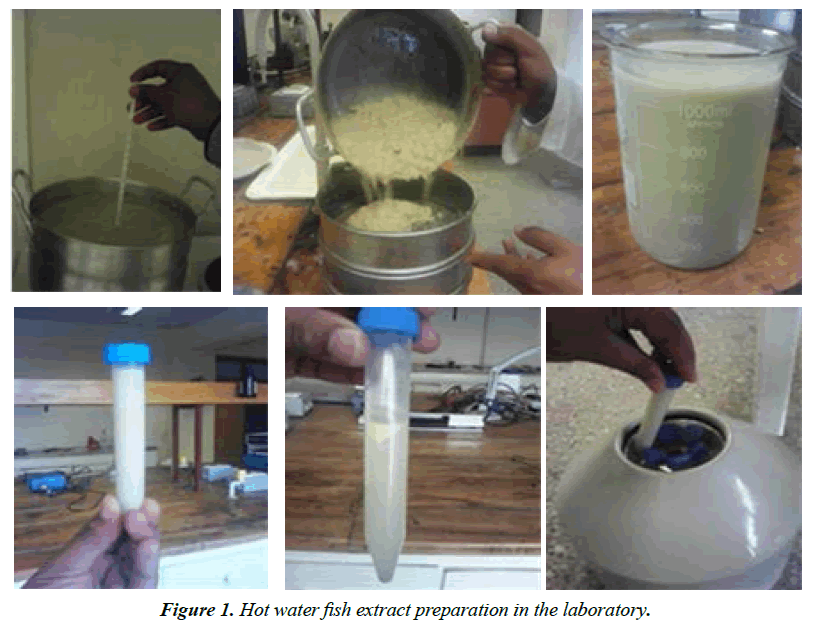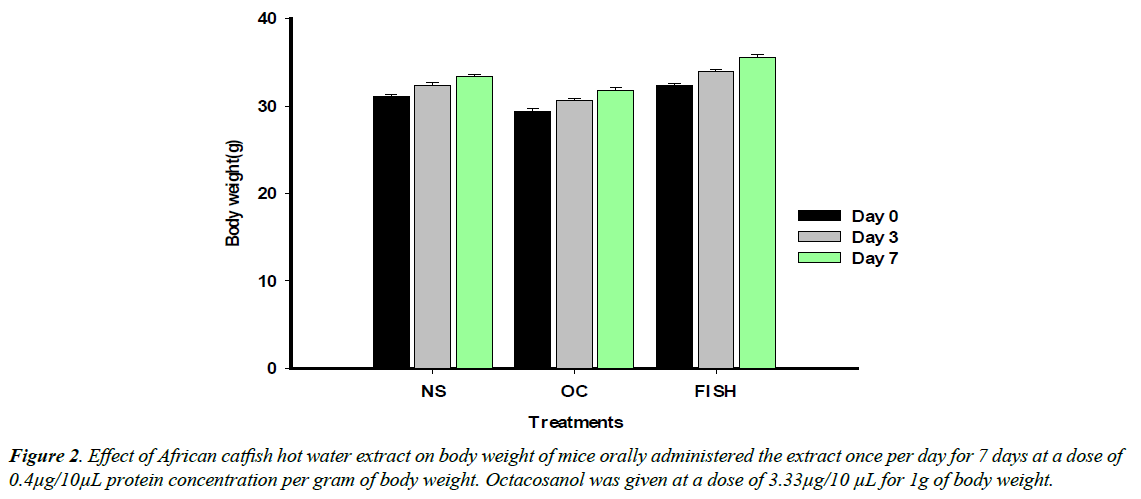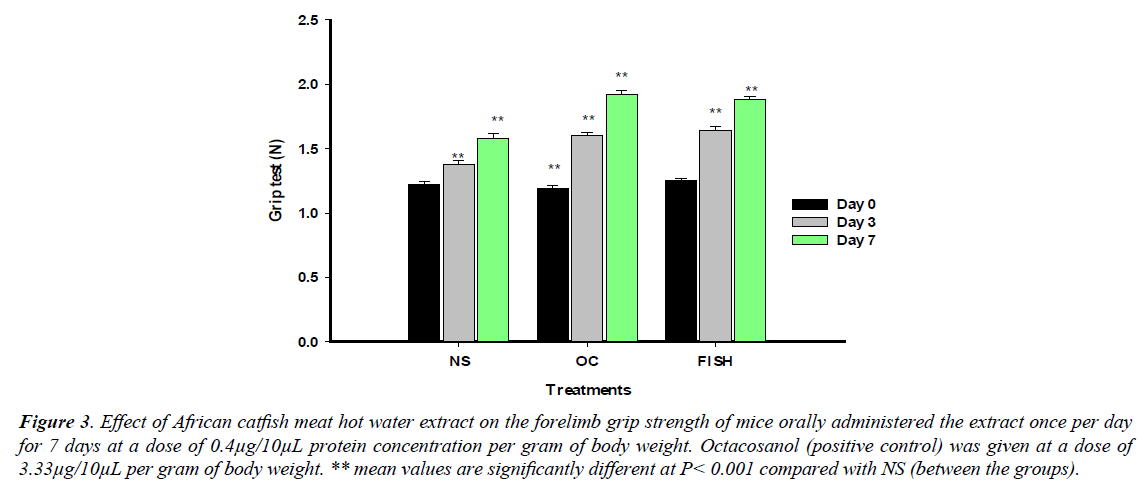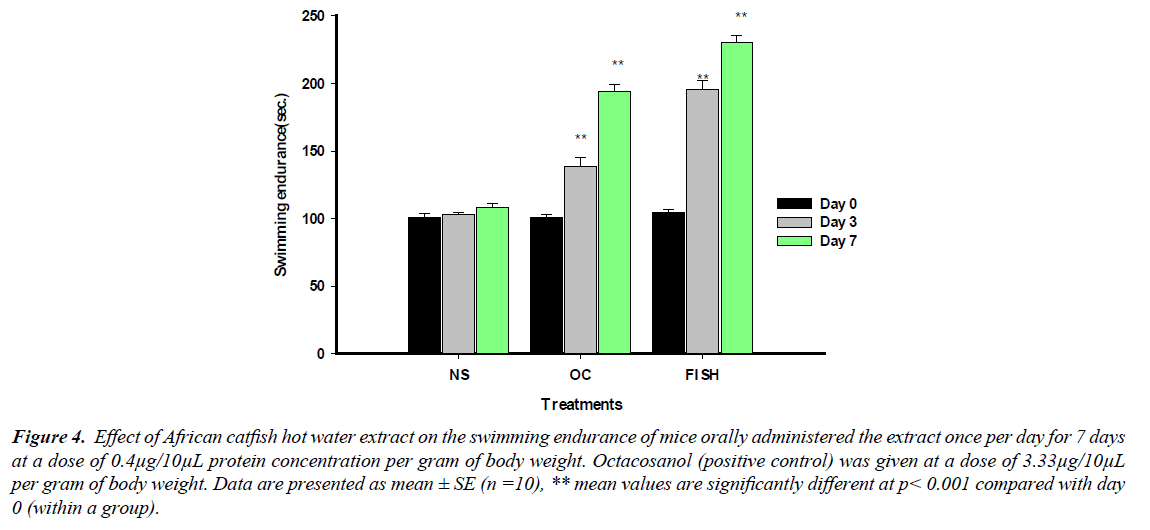Research Article - Journal of Fisheries Research (2022) Volume 6, Issue 4
Exercise performance and anti-fatigue effects of the meat extract of the African catfish, Clarias gariepinus (Burch ell, 1822) on albino mice.
Tekleweyni Asayehegn1*, Tadesse Fetahi2 and Paulos Getachew3
1Department of Aquatic Sciences, Fisheries and Aquaculture, Hawassa University, P.O. Box 5, Hawassa, Ethiopia
2Department of Zoological Sciences, Addis Ababa University, P.O. Box 1176, Addis Ababa, Ethiopia
3Department of Food Science and Nutrition, Addis Ababa University, P.O. Box 1176, Addis Ababa, Ethiopia
- *Corresponding Author:
- Asayehegn T
Department of Aquatic Sciences
Fisheries and Aquaculture
Hawassa University
P.O. Box 5, Hawassa, Ethiopia
E-mail: teklew951@gmail.com
Received: 21-Jun-2022, Manuscript No. AAJFR-22-67144; Editor assigned: 24-Jun-2022, PreQC No. AAJFR-22-67144(PQ); Reviewed: 08-Jul-2022, QC No. AAJFR-22-67144; Published: 25-Jul-2022, DOI:10.35841/aajfr-6.4.117
Citation: Asayehegn T, Fetahi T, Getachew P. Exercise performance and anti-fatigue effects of the meat extract of the African catfish, Clarias gariepinus (Burch ell, 1822) on albino mice. J Fish Res. 2022;6(4):117
Abstract
Different natural compounds are important to mitigate the effects of fatigue and enhance exercise performance, out of which soup of fish is the basic one. The soup of fish has so many benefits including anti-fatigue, exercise performance enhancement and anti-thrombic effects. Thus, knowledge that describes the anti-fatigue effect and exercise performance enhancement of the extract of fish is necessary for its ultimate utilization and commercial use. Fillets of African catfish were collected between May and June, 2018 from Lake Koka. Extraction of the soup was done immediately using boiled water following standard methods. The hot water extract of the meat of African catfish significantly improved (p<0.05) physical exercise, fore limb and hind limb muscle densities, swimming endurance with time, fore limb grip strength and biochemical parameters in mice and hence indicated potential reduction in fatigue development. Although, the extract was found to decrease the triglyceride and cholesterol levels which is important to improve exercise performance in mice, further studies are recommended to elucidate the precise mechanisms of the extract in reducing triglyceride and total cholesterol levels
Keywords
Anti-fatigue, Anti-thrombic, Biochemical parameters, Meat extract.
Introduction
Fish is highly nutritious with balanced amino acids, minerals and vitamins and can be eaten in various ways to use the various nutrients that it contains of the cooking/preparation, tonic soup using hot water extract is the basic one associated with many health benefits. Traditionally, people have been using the tonic soup extracted from fish for medicinal purposes including relief from cough, cold and also to gain physical strength to work actively [1].
Results from some studies revealed that the soup extracted from fish has anti-fatigue effects and improves physical exercise [2]. Fatigue causes tiredness or exhaustion which is becoming a growing focus for clinical research by health professionals with the recognition that it is a legitimate and discrete phenomenon experienced by many people [3]. It can also cause various disorders of the bio regulatory, autonomic nervous system, endocrine, and immune systems [4]. The soup of fish is associated with the elimination of fatigue and improvement of physical exercise as studied by some authors [5]. Having all these negative side effects in human health, it is necessary to investigate the natural anti-fatigue compounds without adverse effects to improve physical activity and athletic ability, postpone fatigue and accelerate the elimination of fatigue in human beings. It is a general belief among traditional people of Ethiopia that the soup from African catfish helps them to get relief from stomach disorders [1]. Therefore, this study was conducted to generate baseline data on the assessment of the anti-fatigue and exercise improvement effects of the hot water extract of African catfish, Clarias garipinus from Lake Koka, Ethiopia.
Materials and Methods
Sample collection and preparation
The fillets of African catfish (6 kg) collected from the Lake Koka between March and July, 2018 were packed in an ice box and were transported to Food science and Nutrition laboratory of Addis Ababa University. In the laboratory, the samples were immediately washed and extracted using 20 L boiled water at 92 oC. Then, the extract was filtered using 2 mm sieve followed by 0.4 mm mesh-size sieve. The filtrate was then centrifuged for 15 minutes at 3000 RPM (China, 800 D Model). The middle layer was then collected by removing the residue and oily layers. The final extract in a falcon tube was kept at -20 o C in a refrigerator until further analysis [2]. The experiment was done for seven consecutive days.
Crude protein content and total concentration of the extract were determined Kjeldhal method according to the AOAC protocol [6]. Normal saline (0.9%) was bought from pharmacy in Addis Ababa, Ethiopia and Octacosanol tablet was obtained from Ferngrove pharmaceuticals Pty, Ltd., Sydney, Australia. The final concentration of Octacosanol was adjusted to 3.33 μg/10 μl per gram of body weight.
Feeding
Thirty white albino mice (6-8 weeks old) which weighed approximately 27-35 g were used. The 10 mice in each feed (normal saline (negative control), African catfish extract and Octacosanol (positive control)) were kept in a controlled environment at room temperature in a cage. The first group mice (experimental group) were orally administered with the fish extract (0.4 mg/10 μL protein concentration for 1 g of body weight) once per day for 7 consecutive days. The second group mice were orally administered Octacosanol (OC) at (3.33 μg/μL for 1 g of body weight) once a day for 7 days. Similarly, 0.9% of physiological normal saline (10 μL/g of body weight) was orally administered for the third group mice (control group).
Forelimb grip strength, body weight and swimming endurance tests were measured on day zero before treatment, and 1 hr after treatment on the 3rd and 7th days, respectively. Muscle density measurement was done following standard methods adopted from Lee et al. and biochemical assay was done at Arsho clinical laboratories Private Limited Company, Addis Ababa, Ethiopia. Blood samples were collected from the heart of the mice one hour after the last (7th day) grip strength trial and swimming test.
Data analysis
Statistical analysis was done using student’s t-test. All of the animal experiments were done with a minimum of 10 mice per group. Values are reported as mean ± Standard Error (SE). Sigma plot version 11 software was used to describe results in graphical presentation Table 1.
| Glucose (mg/dL) |
Urea(mg/dL) | Triglyceride (mg/dL) |
HDL(mg/dL) | LDL(mg/dL) | Total cholesterol (mg/dL) | Creatine kinase(U/L) | |
|---|---|---|---|---|---|---|---|
| Normal saline | 145.38 ± 3.30 | 70.72 ± 2.28 | 149.69 ± 3.05 | 66.44 ± 2.10 | 40.21 ± 2.14 | 122.46 ± 4.69 | 1316.32 ± 8.21 |
| Fish extract | 206.32 ± 4.25*** | 64.96 ± 2.22 | 99.66 ± 2.44*** | 75.74 ± 2.29 | 34.95 ± 2.30 | 109.36 ± 3.90 | 1082 ± 13.13 |
| Relative activity (%) | 142 | 92 | 67 | 114 | 87 | 89 | 82 |
| Octacosanol | 183.84 ± 3.55 | 49.57 ± 3.17 | 85.84 ± 3.06*** | 88.88 ± 3.16 | 39.95 ± 2.30 | 102.27 ± 3.93 | 179.79 ± 3.75*** |
| Relative activity (%) | 126 | 70 | 57 | 134 | 99 | 84 | 14 |
Table 1. Effect of African catfish hot water extract on serum glucose, urea, triglyceride, HDL, LDL, cholesterol and creatine kinase level one hour after the swimming test on the 7th day of the experiment.
Results and Discussion
Body weight
Mice fed with African catfish extract (soup) and octacosanol (OC) had no significant difference in their body weight when compared with the saline (NS) group in all the experimental days. Although significant difference in body weight was not attained in all the experimental groups, a slight increase in body weight was observed among the three experimental groups as compared with day 0. A similar study by Harwanto indicated that there was no significant change (p>0.05) in body weight in mice fed with hot water extract of soft shell turtle and leather carp, respectively [7]. This is mainly due to the fact that mice were allowed to swim for at least 6 minutes and this does not allow accumulation of fat which gradually increases body weight Figure 1 and Figure 2.
Grip strength
Mice fed with normal saline, Octacosanol and hot water catfish extract had increased forelimb grip strength as the feeding days increased Figure 3. Mice fed with hot water African catfish extract and Octacosanol had significant increased grip strength by 118% and 116% respectively compared with the normal saline group (p< 0.05) on the 3rd day. Similarly, the fish extract and octacosanol fed mice had significantly higher grip strength by 119% and 122% compared with the normal saline group respectively on the 7th day (p<0.05). The results of the present study indicate that the grip strength significantly increased with the feeding time in the mice fed with hot water extract of African catfish compared with the normal saline fed control group and this might be associated with the higher protein content of the extract.
Figure 3: Effect of African catfish meat hot water extract on the forelimb grip strength of mice orally administered the extract once per day for 7 days at a dose of 0.4μg/10μL protein concentration per gram of body weight. Octacosanol (positive control) was given at a dose of 3.33μg/10μL per gram of body weight. ** mean values are significantly different at P< 0.001 compared with NS (between the groups).
Swimming endurance and muscle density measurement
Swimming endurance significantly increased for mice fed with fish extract and octacosanol but not for mice fed with normal saline. On the 3rd and 7th days of feeding, the octacosanol and fish extract fed mice had increased swimming time significantly by 38%, 88% and 92%, 120%, respectively as compared to day 0 (p<0.001). The results from this study demonstrate that the African catfish extract has a much stronger enhancing effect on swimming endurance than does Octacosanol or normal saline. Forelimb and hind limb muscle densities in the fish extract and Octacosanol fed mice had showed significant increment as compared to the mice fed with normal saline (p<0.05). Regarding all the physical tests, this study revealed that the hot water extract of African catfish significantly increased swimming capacity, grip strength and muscle density but had little effect on body weight.
Biochemical tests
Glucose, urea, triglyceride, High Density Lipoprotein (HDP), Low Density Lipoprotein (LDL), total cholesterol and creatine kinase were the biochemical tests analyzed from the blood of the mice. The homeostasis of blood glucose level, a break down product of skeletal and liver glycogen, plays an essential role during prolonged and strenuous exercise. In the present study, mice orally administered with the meat extract of African catfish showed a significant increase in blood glucose levels compared with the normal saline administered group of mice. This increase in blood glucose level may be one pathway to improve physical exercise performance and mediated anti-fatigue effect Figure 4.
Figure 4: Effect of African catfish hot water extract on the swimming endurance of mice orally administered the extract once per day for 7 days at a dose of 0.4μg/10μL protein concentration per gram of body weight. Octacosanol (positive control) was given at a dose of 3.33μg/10μL per gram of body weight. Data are presented as mean ± SE (n =10), ** mean values are significantly different at p< 0.001 compared with day 0 (within a group).
High intensity exercise could physically or chemically cause tissue damage. It can also cause sacromeric damage and muscular cell necrosis [8]. As a result, cells release specific proteins such as Creatine Kinase (CK) and yoglobin into the blood as muscular damage indexes. Clinically, CK is assayed in the blood tests as a marker of myocardial problems, rhabdomyolysis (severe muscle break down), muscular dystrophy, autoimmune myositides and acute renal failure [1,8]. In this study, serum creatine kinase level was significantly higher in the normal saline than the fish extract and octacosanol fed mice groups. This explains the potential of the extract and octacosanol to improve physical exercise performance and reduce fatigue to a minimum level.
Blood urea level is another biochemical index associated with physical fatigue. It is formed in the liver as the end product of protein and amino acid metabolism. The urea level reflects kidney function, although many other factors affect its level, including protein breakdown, dehydration, stress, and fatigue [9]. After prolonged physical activity, blood urea levels normally increase. Upon giving mice the fish extract, urea levels remained as low as 92% compared to the control group. This suggests that the fish extract prevents protein catabolism, even during intense physical exercise, which reflects enhanced endurance. The catfish extract increased the exercise performance of mice, probably in part, by increasing fat utilization via decreasing triglyceride levels (to 66.6%) in blood. Although the mechanisms by which the extract decreased triglyceride and cholesterol levels are unclear, the effect might be beneficial during prolonged exercise, because better utilization of triglyceride might spare glycogen and glucose [10,11]. As a result, the extract prevented the onset of fatigue.
Results from the present study indicated that the fish extracts caused significant increase in HDL and significant reduction in LDL, total cholesterol and triglyceride probably due to the better utilization of fat to enhance exercise performance by decreasing the lipid components. Similar findings were reported by Harwanto in South Korea [5]. The triglyceride/ HDL ratio is a better predictor of coronary arterial disease than lipid alone, and a stronger predictor of myocardial infarction than classical atherogenic indices (LDL: HDL) [12].
In general, muscle weakness is clearly associated with lower muscle mass and muscle quality is an important indicator of muscle function [13]. Hormone supplementation, nutritional interventions, strength and exercise training are most often used to increase muscle mass and strength [14]. Low muscle density has been associated with greater risk of functional limitation, poorer strength and worsens metabolic function [15]. In the present study, mice groups fed with the catfish extract and Octacosanol (positive control) were found with greater muscle density than the normal saline fed mice (control group).
Conclusion
The study indicated that the soup extracted from the meat of Lake Koka African catfish has a positive effect on the exercise performance improvement and fatigue related parameters when compared with the negative control groups. This positive effect might come from the presence of protein, terpenoids, polysaccharides and anti-oxidative property of the hot water extract of the fish. The extract significantly improved physical exercise performance, forelimb and hind limb muscle densities, swimming endurance with time, forelimb grip strength and blood biochemical parameters in the mice. Thus, the extract indicated potential reduction in fatigue development.
Acknowledgement
The study was funded by Austrian Development Cooperation through the Aquatic Ecosystems and Environmental Management program and it was very well accredited. Dr. Tadesse Fetahi and Dr. Paulos Getachew, Addis Ababa University and Professor P. Natarajan, Hawassa University deserve special thanks for commenting on the manuscript.
References
- Tefera, A. Exercise Performance Improvement and Anti-Fatigue Effect of Hot Water Extract of Koroso fish (Oreochromis niloticus). Unpublished M.Sc. Thesis, School of Graduate studies, Addis Ababa University, Addis Ababa. 2017;68.
- Harwanto D, Lee GH, Park SM, et al. Oral administration of a hot water extract of the soft-shell turtle (Trionyxsinensis) improves exercise performance. Prev Nutr Food Sci. 2015;20(2):133-41.
- Potempa K. Chronic fatigue. In Annual Review of Nursing Research. Springer, New York, 1993;11.
- You L, Ren J, Yang B, et al. Antifatigue activities of loach protein hydrolysates with different antioxidant activities. J Agric Food Chem. 2012;60(50):12324-31.
- Lee GH, Harwanto D, Park SM, et al. Hot Water Extract of Leather Carp (Cyprinus carpio) Improves Exercise Performance in Mice. Prev Nutr Food Sci, 2015;20(4):246.
- Association of Official Analytical Chemists (AOAC). Washington DC. 2000.
- Warren GL, Ingalls CP, Lowe DA, et al. Excitation-contraction uncoupling: major role in contraction-induced muscle injury. Exerc Sport Sci Rev. 2001;29(2):82-7.
- Kumar GP, Anand T, Singsit D, et al. Evaluation of antioxidant and anti-fatigue properties of Trigonellafoenum-graecum L. in rats subjected to weight loaded forced swim test. J Pharmacogn. 2013;5(2): 66-71.
- Wang S, Qi B, Liu L, et al. Anti-fatigue effects of proteins isolated from Panax quinquefolium. J Ethnopharmacol. 2014;153(2):430-4.
- Walberg JL, Greenwood MR, Stern JS. Lipoprotein lipase activity and lipolysis after swimming training in obese Zucker rats. Am J Physiol. 1983;245(5):706-12.
- Jung KA, Kim IH, Han DS. Effect of medicinal plant extracts on forced swimming capacity in mice. J Ethnopharmacol. 2004;93(1):75-81.
- Gaziano MJ, Charles HH, Christopher JO, et al. Fasting triglycerides, Higher Density Lipoprotein and Risk of Myocardial infarction. AHA journals. 1997;96(8):2520-5.
- Goodpaster BH, Carlson CL, Visser M, et al. Attenuation of skeletal muscle and strength in the elderly: The Health ABC Study. J Appl Physiol. 2001; 90(6):2157-65.
- Blackman MR, Sorkin JD, Münzer T, et al. Growth hormone and sex steroid administration in healthy aged women and men: a randomized controlled trial. Jama.2002;288(18):2282-92.
- Ryan AS, Nicklas BJ, Berman DM, et al. Dietary restriction and walking reduce fat deposition in the mid-thigh in obese older women. AJCN. 2000;72(3):708-13.
Indexed at, Google Scholar, Cross Ref
Indexed at, Google Scholar, Cross Ref
Indexed at, Google Scholar, Cross Ref
Indexed at, Google Scholar, Cross Ref
Indexed at, Google Scholar, Cross Ref
Indexed at, Google Scholar, Cross Ref
Indexed at, Google Scholar, Cross Ref
Indexed at, Google Scholar, Cross Ref
Indexed at, Google Scholar, Cross Ref



